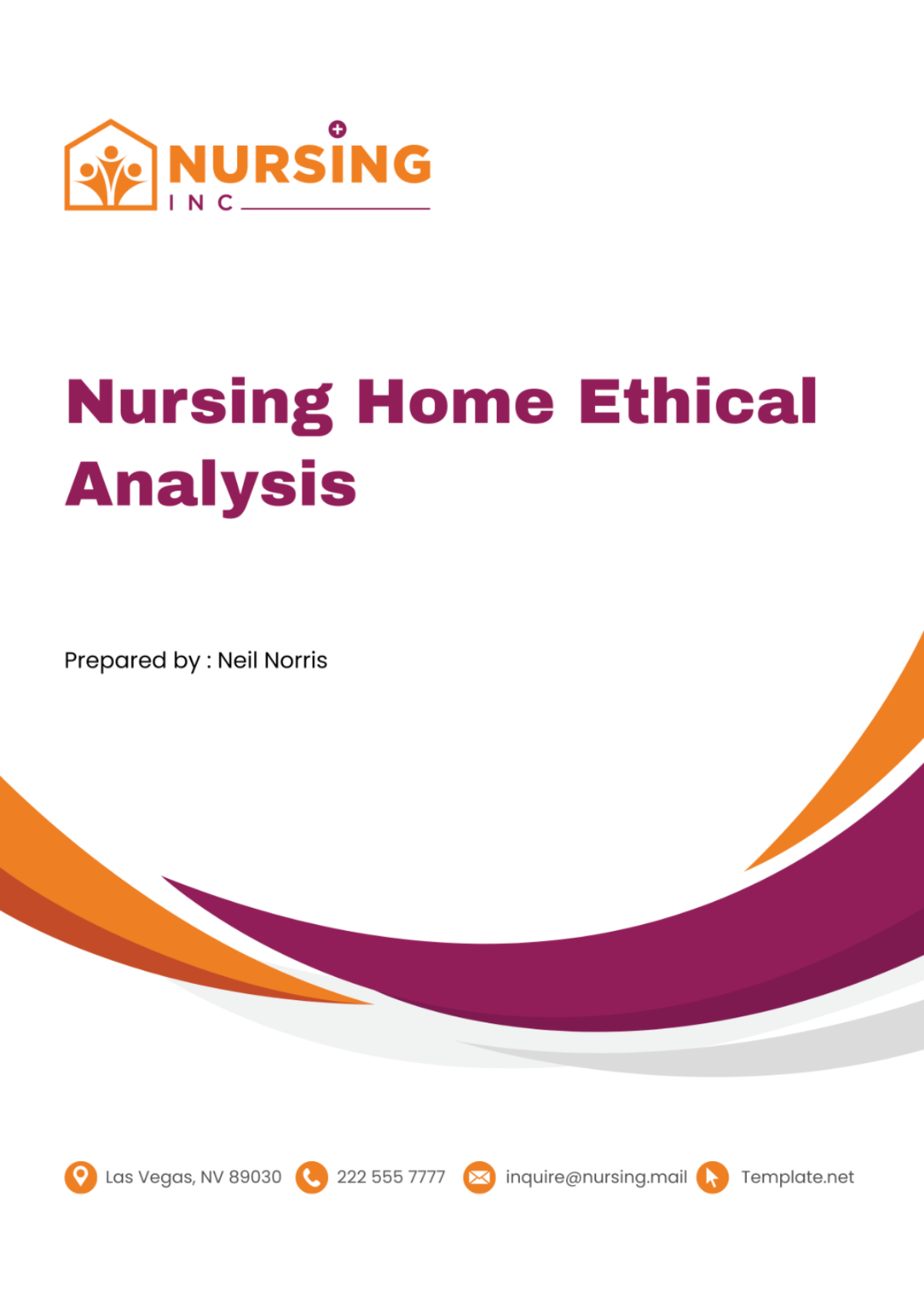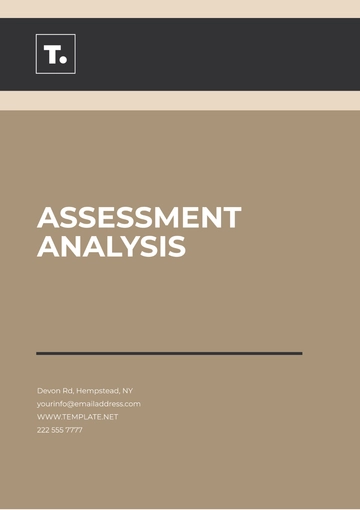Free Nursing Home Ethical Analysis

A. Introduction
The growing focus on ethical dilemmas in various medical fields has brought into light the ethical issues that occur in nursing homes. Ethical dilemmas primarily concern the principles of right and wrong practices. In nursing homes, these issues are often intertwined with medical care, elderly care, end-of-life decisions, and the rights of residents. The objective of this analysis is to comprehensively examine these ethical considerations and dilemmas within the nursing home setting. We seek to identify and evaluate the ethical responsibilities and values that should drive decisions and practices in these facilities to safeguard the well-being and rights of residents.
B. Background and Context
The provision of care in nursing homes is governed by a complex web of laws, regulations, and ethical standards designed to ensure the safety, dignity, and well-being of residents. In the United States, nursing homes are regulated primarily by federal and state governments, with oversight provided by agencies such as the Centers for Medicare & Medicaid Services (CMS) and state departments of health. The Nursing Home Reform Act of 1987, enacted as part of the Omnibus Budget Reconciliation Act (OBRA '87), established a comprehensive set of regulations governing nursing home operations and resident rights. These regulations set forth requirements for staffing, quality of care, resident assessments, and the rights of residents to participate in their own care decisions.
Additionally, nursing homes are expected to adhere to ethical principles that prioritize the autonomy, dignity, and well-being of residents. Ethical considerations in this context may include issues such as informed consent, end-of-life care, resident autonomy, and the prevention of elder abuse and neglect. Nursing home administrators and staff are tasked with navigating these complex ethical dilemmas while upholding the highest standards of care and professionalism. As the population ages and demand for long-term care services increases, ensuring ethical practices in nursing homes becomes increasingly important to protect the rights and dignity of vulnerable residents.
C. Ethical Principles and Frameworks
In the realm of nursing home care, ethical decision-making is guided by a set of fundamental principles and frameworks aimed at promoting resident autonomy, dignity, and well-being. These principles serve as a foundation for navigating complex ethical dilemmas that arise in the provision of care to elderly and vulnerable individuals.
1. Respect for Autonomy
Informed Consent: Residents have the right to make their own healthcare decisions based on accurate information provided by healthcare professionals. This includes the right to refuse treatment or services.
Capacity Assessment: Before obtaining consent, healthcare providers must assess the resident's decision-making capacity to ensure they are able to understand relevant information and make informed choices.
Advance Directives: Nursing homes must honor residents' advance directives, such as living wills and durable power of attorney for healthcare, which outline their preferences for medical treatment in the event they are unable to communicate.
2. Beneficence and Nonmaleficence
Quality of Care: Nursing homes have a duty to provide care that promotes the well-being and comfort of residents while minimizing harm.
Staff Competency: Ensuring staff members are adequately trained and competent to provide high-quality care is essential to fulfilling this ethical principle.
Prevention of Harm: Nursing homes must take measures to prevent physical, emotional, and psychological harm to residents, including the prevention of falls, medication errors, and abuse.
3. Justice
Fair Allocation of Resources: Nursing homes must allocate resources fairly and equitably to ensure all residents receive appropriate care and services.
Equitable Access: Facilities should strive to provide access to care regardless of residents' socio-economic status, race, ethnicity, or other demographic factors.
Fair Treatment: All residents should be treated fairly and without discrimination, with access to the same standard of care regardless of personal characteristics.
4. Fidelity
Professional Integrity: Nursing home staff are obligated to act with honesty, integrity, and loyalty to residents, adhering to ethical and legal standards in their interactions and decision-making.
Confidentiality: Staff must maintain resident confidentiality and privacy, respecting their right to control the disclosure of personal health information.
Avoiding Conflicts of Interest: Healthcare professionals should prioritize the interests and well-being of residents above personal or financial interests to maintain trust and integrity in the caregiving relationship.
D. Key Ethical Issues
Navigating the ethical landscape of nursing home care involves addressing a myriad of complex challenges that impact the well-being and rights of residents. By identifying and understanding these key ethical issues, nursing home administrators and staff can implement policies and practices that uphold the highest standards of care and ethics.
Below is a table outlining some of the most prevalent ethical issues in nursing homes, along with their implications and considerations:
Ethical Issue | Implications | Considerations |
|---|---|---|
Informed Consent | Residents' autonomy and right to self-determination | Capacity assessment, advance directives |
End-of-life Decision-making | Dignity, quality of life, and respect for resident wishes | Palliative care options, advance care planning |
Resident Rights | Protection of autonomy and dignity | Privacy, freedom from abuse and neglect, access to resources |
Quality of Care | Resident well-being and prevention of harm | Staff training, adequate staffing levels, monitoring of care |
Resource Allocation | Fairness and equitable access to care | Prioritization of scarce resources, transparency in allocation decisions |
Conflicts of Interest | Integrity and trust in the caregiver-resident relationship | Disclosure of potential conflicts, avoidance of bias |
Cultural Sensitivity | Respect for diversity and individual beliefs | Cultural competence training, accommodation of cultural practices |
Addressing these ethical issues requires a multifaceted approach that considers the unique needs and circumstances of each nursing home resident while adhering to legal and ethical standards. By proactively addressing these challenges, nursing homes can cultivate environments that promote resident well-being, autonomy, and dignity.
E. Case Studies or Scenarios
Examining real-life scenarios or hypothetical cases allows for a deeper understanding of how ethical principles apply in the context of nursing home care. Below are two case studies illustrating common ethical dilemmas faced by nursing home staff:
Case Study 1: Informed Consent
Mrs. Smith, an 85-year-old resident with advanced dementia, requires surgery for a hip fracture. Her daughter, who holds durable power of attorney, consents to the procedure despite Mrs. Smith's inability to understand or participate in the decision-making process. Ethical considerations include respecting Mrs. Smith's autonomy while honoring her daughter's legal authority and ensuring decisions align with Mrs. Smith's best interests.
Case Study 2: End-of-life Decision-making
Mr. Johnson, a 75-year-old resident with terminal cancer, expresses a desire to forgo aggressive treatment and receive palliative care. However, his family insists on pursuing all available medical interventions. Ethical considerations involve balancing Mr. Johnson's autonomy and dignity with the family's wishes, ensuring decisions reflect his values and preferences while providing support and guidance to the family during this difficult time.
These case studies highlight the complexities of ethical decision-making in nursing homes and the importance of considering the unique circumstances and preferences of each resident. By engaging in thoughtful reflection and dialogue, nursing home staff can navigate these dilemmas while upholding the principles of respect, beneficence, and justice.
F. Ethical Decision-Making Process
Navigating ethical dilemmas in nursing home care requires a systematic approach that considers the needs and rights of residents alongside legal and ethical standards. The following ethical decision-making process provides a framework for addressing complex ethical issues while promoting resident well-being and autonomy:

Identify the Problem: Clearly define the ethical dilemma or issue at hand, considering the perspectives and values of all stakeholders involved.
Gather Information: Collect relevant facts, including the resident's medical history, preferences, and legal considerations, to inform decision-making.
Consider Ethical Principles: Apply ethical principles such as respect for autonomy, beneficence, nonmaleficence, and justice to evaluate potential courses of action.
Explore Alternatives: Generate and evaluate alternative solutions that uphold ethical principles and align with the resident's best interests.
Evaluate Consequences: Consider the potential outcomes and consequences of each alternative, including short-term and long-term effects on the resident and other stakeholders.
Make a Decision: Based on a thorough analysis of the ethical considerations and consequences, make a reasoned decision that respects the resident's autonomy, promotes their well-being, and adheres to legal and ethical standards.
G. Recommendations and Conclusion
In conclusion, addressing ethical challenges in nursing home care requires a multifaceted approach that prioritizes the well-being, autonomy, and dignity of residents. By implementing the following recommendations, nursing homes can uphold ethical standards and promote a culture of compassionate care:
Firstly, prioritize resident-centered care by actively involving residents in decision-making processes, respecting their autonomy, and honoring their preferences and choices. This includes facilitating discussions about advance care planning and end-of-life wishes to ensure that care aligns with residents' values and goals.
Secondly, invest in staff training and education to enhance ethical awareness and competence among healthcare professionals. By providing ongoing education on ethical principles, communication skills, and cultural competence, nursing homes can empower staff to navigate complex ethical dilemmas with confidence and compassion.
Lastly, foster a culture of transparency, accountability, and continuous improvement within nursing home environments. Encourage open dialogue among staff, residents, families, and stakeholders, and regularly evaluate policies, practices, and outcomes to identify areas for enhancement and ensure ethical standards are upheld.
In conclusion, by prioritizing resident-centered care, investing in staff training, and fostering a culture of transparency and accountability, nursing homes can navigate ethical challenges effectively and ensure the highest quality of care for residents. Through these efforts, nursing homes can uphold their ethical responsibilities and provide a safe, supportive, and dignified environment for elderly and vulnerable individuals.
- 100% Customizable, free editor
- Access 1 Million+ Templates, photo’s & graphics
- Download or share as a template
- Click and replace photos, graphics, text, backgrounds
- Resize, crop, AI write & more
- Access advanced editor
Strengthen ethical practices with the Nursing Home Ethical Analysis Template from Template.net. This editable and customizable template provides a framework for examining ethical considerations and dilemmas in nursing home operations. Editable in our Ai Editor Tool, it's crucial for guiding ethical decision-making, ensuring respectful and dignified care, and upholding the highest standards of integrity in your nursing home.





























